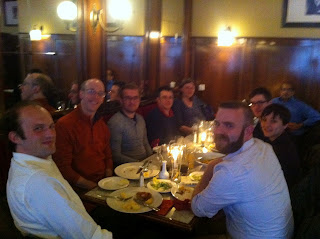Saturday, March 31, 2012
Post-Pre-Pre-GLOW memory mechanisms workshop dinner, March 26, 2012, Potsdam
Last week, the whole linguistic world descended on Potsdam in connection with the GLOW conference. Embedded within that world is another world that works on memory mechanisms. So we parasitically organized an open-ended discussion on some major open issues. It was basically all of Maryland and all of Potsdam, plus Philip Hofmeister and Patrick Sturt and John Hale.
The meeting was very, very productive, much better than the talks+discussion model.
We will do this again next year!
Saturday, March 24, 2012
Monday, March 12, 2012
(Attempted) replication drama unfolding on the web
Discussed here. One side issue here is the inherent value of replication. In psycholinguistics too, replications (including failed replications) tend to be treated as somehow less valuable than "new" studies (they're just as valuable, in my opinion, only in a different way).
Saturday, March 3, 2012
Continuity of Mind by Spivey
Here is a fantastic book (Continuity of Mind, by Michael Spivey), of great relevance to people like us. It has a great chapter on language comprehension, an excellent, high-level overview of the constraint-based view (inter alia), ideal for entry level psycholinguists. This chapter also has some very important ideas hidden in it, which have not yet been exploited in sentence comprehension research.
Friday, March 2, 2012
What use are journal impact factors?
This article on arXiv discusses several important facts about journal impact factors. This is an interesting issue for psycholinguistics; I have encountered the situation in our field of a person who said he would not cite a paper because it didn't appear in a high impact factor journal. Another, an editor in a high-impact journal (high impact factor in our field means 3 or more ;), once said to me he only reads papers that come out in a specific journal X, because if it didn't appear there, it's not worth reading by definition.
Educating people is hard. If you are too busy to read the article linked below, I can summarize the advice for you: read the paper to decide if it has anything of importance; don't look at the impact factor of the journal to decide whether to read it.
http://arxiv.org/abs/1010.0278
Of course, it is possible that what holds for applied mathematics has no relevance for psycholinguistics.
Educating people is hard. If you are too busy to read the article linked below, I can summarize the advice for you: read the paper to decide if it has anything of importance; don't look at the impact factor of the journal to decide whether to read it.
http://arxiv.org/abs/1010.0278
Of course, it is possible that what holds for applied mathematics has no relevance for psycholinguistics.
Subscribe to:
Comments (Atom)





